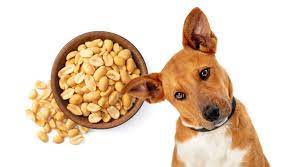Can Dogs Have Peanuts: A Comprehensive Guide to Peanut Safety for Your Canine Companion
As a pet owner, you may be curious about whether peanuts are safe for your furry friend. In this article, we’ll explore the question, “Can dogs have peanuts?” and provide you with important insights into peanut safety for dogs.

Understanding Dogs and Peanuts: Is Peanut Consumption Safe for Dogs?
Peanuts are a common human snack, but can they be shared with our canine companions? Let’s delve into the factors that determine whether dogs can have peanuts and what you need to know to make informed decisions.
Nutritional Content of Peanuts
Peanuts are packed with nutrients like protein, healthy fats, and vitamins. However, it’s essential to consider whether these nutrients are beneficial or potentially harmful to dogs.
Peanut Allergies in Dogs
Similar to humans, dogs can have allergies, including peanut allergies. Understanding the symptoms of allergic reactions is crucial in determining if your dog can safely consume peanuts.
Risks and Potential Dangers
While peanuts offer nutritional value, there are risks associated with feeding them to dogs. Factors such as choking hazards, salt content, and the risk of pancreatitis need to be considered.
Expert Insights: Canine Nutritionists and Veterinarians Weigh In
To provide a comprehensive understanding of the topic, it’s important to seek advice from experts in canine nutrition and veterinary medicine.
Canine Nutritionists
Experts in canine nutrition can offer insights into how peanuts fit into a dog’s diet. They can provide recommendations on appropriate portion sizes and how peanuts can be included safely.
Veterinarians
Veterinarians are the go-to professionals for understanding a dog’s dietary needs and potential risks. They can advise on allergies, health conditions, and how peanuts may impact your dog’s well-being.
Peanut Butter and Dogs
Peanut butter is a popular treat for dogs, but it’s essential to examine peanut butter’s ingredients and choose options with minimal additives or artificial sweeteners that could be harmful to dogs.
Peanut Safety and Precautions: What You Need to Know
Now that we’ve explored the basics, let’s delve deeper into the safety considerations and precautions when it comes to sharing peanuts with your furry friend.
Peanut Allergies in Dogs
Peanut allergies can affect dogs just as they can humans. Keep an eye out for symptoms like itching, swelling, hives, or gastrointestinal distress after peanut consumption.
Choking Hazards
Whole peanuts or large chunks can pose a choking hazard for dogs, especially smaller breeds. It’s recommended to avoid feeding whole peanuts and opt for small, safe pieces.
Salt and Seasonings
Salted peanuts or those with added seasonings should be avoided. Excessive salt intake can lead to sodium toxicity in dogs, which can be harmful to their health.
Peanuts in Moderation: When and How to Share
If you decide to share peanuts with your dog, it’s important to do so in moderation and with careful consideration.
Consult Your Veterinarian
Before introducing peanuts to your dog’s diet, consult your veterinarian. They can assess your dog’s individual health needs and advise whether peanuts are suitable.
Peanut Butter: A Popular Choice
If you’re considering peanut butter, opt for natural varieties with minimal ingredients. Peanut butter can be used as an occasional treat or for hiding medication.
Homemade Peanut Treats
If you’re looking for ways to incorporate peanuts into your dog’s diet, consider making homemade treats using unsalted and unsweetened peanut butter.
Frequently Asked Questions (FAQs) About Dogs and Peanuts
1: Can dogs eat peanuts?
Yes, but in moderation. Plain, unsalted, and unsweetened peanuts are safer. However, consider potential allergies and choking hazards.
2: Are peanuts safe for all dog breeds?
While peanuts are generally safe, smaller breeds may be at higher risk of choking. Always ensure peanuts are in small, manageable pieces.
3: Can dogs be allergic to peanuts?
Yes, some dogs can have peanut allergies. Watch for symptoms like itching, swelling, or digestive issues after peanut consumption.
4: Is peanut butter safe for dogs?
Yes, in moderation and if it’s natural and free of additives. Use peanut butter as an occasional treat or for hiding medication.
5: What are the risks of giving dogs peanuts?
Risks include allergies, choking hazards, and excessive salt intake. Avoid salted or seasoned peanuts and opt for plain varieties.
6: How do I introduce peanuts to my dog’s diet?
Consult your vet first. If approved, start with small, plain peanut pieces. Monitor for any adverse reactions.
7: Can dogs have peanut butter cookies or baked goods?
It’s best to avoid peanut butter cookies or baked goods meant for humans. They may contain ingredients harmful to dogs.
8: Are there alternative nut options for dogs?
Yes, options like unsalted almonds or cashews (in moderation) can be considered. Always consult your vet before introducing new foods.
9: Can I give my dog peanut shells?
No, peanut shells are not safe for dogs. They can be difficult to digest and may pose a choking hazard.
10: How do I know if my dog is having an allergic reaction to peanuts?
Watch for signs like itching, redness, swelling, vomiting, or diarrhea. If you suspect an allergy, consult your veterinarian.
Conclusion
The question, “Can dogs have peanuts?” comes with important considerations. While peanuts can offer nutritional benefits, they also present potential risks. It’s crucial to prioritize your dog’s well-being, consult experts, and make informed decisions.




